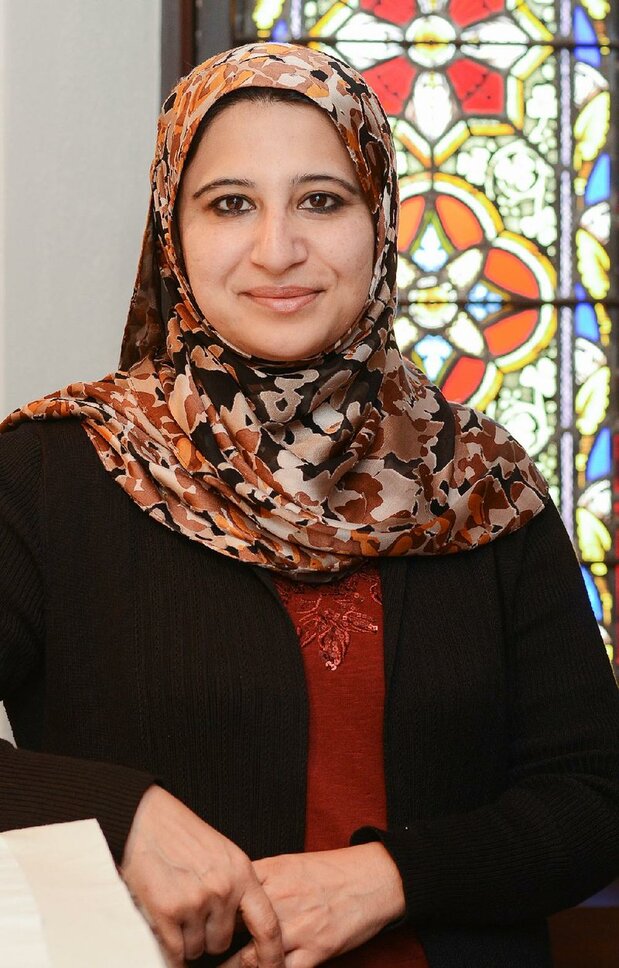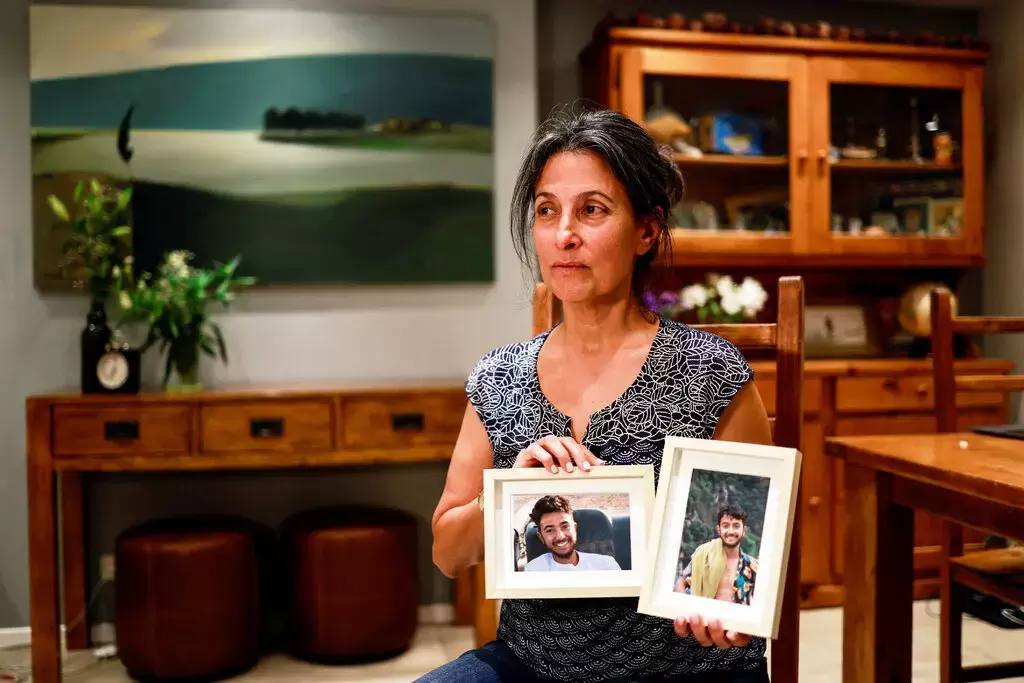
Photo by Elly Johnson on Unsplash
Radical, Non-Binary Love
Understanding the Yearnings
of My Enemies
Whitehead speaks of God as a fellow sufferer who understands. This means that God understands the yearnings of my enemies, those who desire to kill me and my loved ones.
Am I expected to understand their yearnings, too? If I do so, am I betraying those on "my side" who suffer from their violence?
*
I am moved by the letter below from Sophia Said, who in "Practicing Compassion in a Time of Deep Sorrow," speaks of sadness for all sides of the Palestine/Israel tragedy. She is the Executive Director of the Interfaith Center of Arkansas, and her letter (see below for its entirety) was sent to the many members of the Interfaith Center who turn to her for guidance. She writes:
I know that expressing compassion for “one group”, even momentarily, can be felt as betrayal of the “other group”. Showing care for the “other group” is hard emotional work because it requires us to reject the binary which says we cannot weep for everyone. However, we, human beings, are very much capable of radical love. We can practice radical empathy for the suffering of all others on the basis of our shared humanity.
Please join me in praying for all the innocent lives that are lost, for everlasting peace in this region, which has been suffering for far too long, and let's hold each hurting soul in a place of deep love within our hearts.
Please note, her prayer is "for all the innocent lives." Let us ask about the non-innocent lives, too.
*
Jesus commands those who follow him to love their enemies.
You have heard that it was said, ‘Love your neighbor’ and ‘Hate your enemy.’ But I tell you, love your enemies and pray for those who persecute you, that you may be sons of your Father in heaven. He causes His sun to rise on the evil and the good, and sends rain on the righteous and the unrighteous.… (Matthew 5:21)
The idea of loving your enemies is very dangerous territory, and only those who are truly threatened can speak with authenticity. It is easy to preach "loving your enemies" when you are safe and secure, but difficult if not impossible to do it in the midst of trauma.
And perhaps not necessary, either. Contrary to Jesus, "loving your enemies" may not be what is called for, not even by God, in times of pain. Process theologians, influenced by Whitehead, speak of God's presence in the world as an inwardly felt beckoning or lure to respond to immediate situations in the best way possible relative to context.
I find it imaginable that people in traumatic situations are inwardly beckoned, by the Holy itself, to hate their enemies as a coping mechanism, a way of survival. As a Christian I believe that the ideal of "loving your enemies" is noble in its vision, but not always possible or even desirable in situations of abuse. Surely God, "the fellow sufferer who understands," understands our limitations.
*
Still, I am challenged by the words of Rachel Goldberg, the American-Israeli mother of Hersh Goldberg Polin, who was taken hostage by Hamas while attending a music festival in southern Israel.
In an interview with the Daily of the NY Times, she is asked if she feels compassion for the suffering children in Gaza. She says that she does. She is then asked if she would like to understand Hamas. She says:
I would like to understand who they are. I want to understand them more. If they say "I want you dead," it's very hard for me to meet them halfway on that. Obviously, there's a tremendous amount of pain and agony behind a group of people who want the destruction completely of another people. I am not sure how you work through that or how you try to talk through that. But I am really interested in hearing what they have to say. I want to know what's this method, how does the world become sympathetic when you have elderly women and children. What is it exactly that you want. I want really to understand the goal. I don't get it, I would like to get it.
She does not express love for the murderers. Hers is not a sentimental love. "I really want to understand the goal" is a far cry from motherly affection, and understandably so. Her affection is for her son. But she does express curiosity and even a hint of sympathetic understanding. She knows there is "a tremendous amount of pain and agony" behind their desire to destroy another people as she is curious about their goals.
Rachel Goldberg takes a step in a courageous direction. She is doing what Sophia Said calls "the hard emotional work." Perhaps the lure of God toward what Sophia Said calls radical, non-binary love begins with curiosity about the goals of enemies and, implicitly, with the agony and pain that give rise to their subjective aims.
If God is indeed, as Whitehead says, a "fellow sufferer who understands," then perhaps even God's understanding begins with an understanding of the agonies and aims behind the violence...on all sides, in a non-binary way. In the language of Sophia Said, perhaps God holds each hurting heard, even the hearts of the non-innocent, in a place of deep love.
*
Process theology speaks of "yearnings" as part of the very ontology of life. Not only human beings but all living beings yearn to survive with satisfaction relative to the context of their lives. We live in a universe of yearning, of desire, of aiming at satisfaction. Wherever there is energy, say process theologians, there is yearning. Even in living cells and even in the depths of atoms. Process theology adds that, moment by moment, these yearnings are inwardly beckoned, in their initial phases, by the yearnings of God. We are inwardly "lured" by God, to use their language.
This Lure is not the only lure within us. We also have lures that come from society, our own egos, and our bodily chemistry. We can be lured to fear, to hate, to murder, and to revenge. These non-divine lures are tempting in their own right, and often we fall victim to them. We become slaves to hatred rather than, as it were, slaves to divine Love. This happens all the time, not only in our enemies but in us. We sin.
Still, say process theologians, we carry within us something of a divine spark, a divine hope. The sparks are God's energizing hopes, God's inwardly felt prayers, that we will live from mercy and compassion, not greed and hatred, as is possible. Our enemies carry these sparks, too. The sparks do not discriminate between the deserving and the undeserving, the righteous and the unrighteous. They are in everyone.
It is possible that the hard emotional work begins, not only with curiosity about goals, but with curiosity about how the goals have so fallen away from the sparks. After all, the divine Companion, the "fellow sufferer who understands," understands our sins as well as our virtues. Rachel Goldberg leans in this direction. And so do many mothers in Gaza. If you have a son, you know that mothers on "the other side" have sons, too. You know that they love their sons and daughters as you love yours.
Islam has a teaching that the Holy One has qualities of wrath as well as mercy, but that mercy is greater than the wrath. Mercy begins with curiosity about motives, with a desire to understand the agonies and the yearnings, and the bondage to sin by which even carriers of divine sparks can be enslaved.
Perhaps this is what Jesus had in mind when he said we should love our enemies. We need not hide from a recognition of their sins or our own. We all fall short of the glory of the Merciful and Compassionate.
But we fall terribly short of the divinity within us for finite, and sometimes understandable reasons, mostly rooted in pain. Not approvable reasons, but understandable reasons. We are confused, frightened, angry, frustrated, and sometimes hateful. We do terrible things. God does not sanction the terror but God understands the pain. God is a fellow sufferer who understands.
Jay McDaniel
Am I expected to understand their yearnings, too? If I do so, am I betraying those on "my side" who suffer from their violence?
*
I am moved by the letter below from Sophia Said, who in "Practicing Compassion in a Time of Deep Sorrow," speaks of sadness for all sides of the Palestine/Israel tragedy. She is the Executive Director of the Interfaith Center of Arkansas, and her letter (see below for its entirety) was sent to the many members of the Interfaith Center who turn to her for guidance. She writes:
I know that expressing compassion for “one group”, even momentarily, can be felt as betrayal of the “other group”. Showing care for the “other group” is hard emotional work because it requires us to reject the binary which says we cannot weep for everyone. However, we, human beings, are very much capable of radical love. We can practice radical empathy for the suffering of all others on the basis of our shared humanity.
Please join me in praying for all the innocent lives that are lost, for everlasting peace in this region, which has been suffering for far too long, and let's hold each hurting soul in a place of deep love within our hearts.
Please note, her prayer is "for all the innocent lives." Let us ask about the non-innocent lives, too.
*
Jesus commands those who follow him to love their enemies.
You have heard that it was said, ‘Love your neighbor’ and ‘Hate your enemy.’ But I tell you, love your enemies and pray for those who persecute you, that you may be sons of your Father in heaven. He causes His sun to rise on the evil and the good, and sends rain on the righteous and the unrighteous.… (Matthew 5:21)
The idea of loving your enemies is very dangerous territory, and only those who are truly threatened can speak with authenticity. It is easy to preach "loving your enemies" when you are safe and secure, but difficult if not impossible to do it in the midst of trauma.
And perhaps not necessary, either. Contrary to Jesus, "loving your enemies" may not be what is called for, not even by God, in times of pain. Process theologians, influenced by Whitehead, speak of God's presence in the world as an inwardly felt beckoning or lure to respond to immediate situations in the best way possible relative to context.
I find it imaginable that people in traumatic situations are inwardly beckoned, by the Holy itself, to hate their enemies as a coping mechanism, a way of survival. As a Christian I believe that the ideal of "loving your enemies" is noble in its vision, but not always possible or even desirable in situations of abuse. Surely God, "the fellow sufferer who understands," understands our limitations.
*
Still, I am challenged by the words of Rachel Goldberg, the American-Israeli mother of Hersh Goldberg Polin, who was taken hostage by Hamas while attending a music festival in southern Israel.
In an interview with the Daily of the NY Times, she is asked if she feels compassion for the suffering children in Gaza. She says that she does. She is then asked if she would like to understand Hamas. She says:
I would like to understand who they are. I want to understand them more. If they say "I want you dead," it's very hard for me to meet them halfway on that. Obviously, there's a tremendous amount of pain and agony behind a group of people who want the destruction completely of another people. I am not sure how you work through that or how you try to talk through that. But I am really interested in hearing what they have to say. I want to know what's this method, how does the world become sympathetic when you have elderly women and children. What is it exactly that you want. I want really to understand the goal. I don't get it, I would like to get it.
She does not express love for the murderers. Hers is not a sentimental love. "I really want to understand the goal" is a far cry from motherly affection, and understandably so. Her affection is for her son. But she does express curiosity and even a hint of sympathetic understanding. She knows there is "a tremendous amount of pain and agony" behind their desire to destroy another people as she is curious about their goals.
Rachel Goldberg takes a step in a courageous direction. She is doing what Sophia Said calls "the hard emotional work." Perhaps the lure of God toward what Sophia Said calls radical, non-binary love begins with curiosity about the goals of enemies and, implicitly, with the agony and pain that give rise to their subjective aims.
If God is indeed, as Whitehead says, a "fellow sufferer who understands," then perhaps even God's understanding begins with an understanding of the agonies and aims behind the violence...on all sides, in a non-binary way. In the language of Sophia Said, perhaps God holds each hurting heard, even the hearts of the non-innocent, in a place of deep love.
*
Process theology speaks of "yearnings" as part of the very ontology of life. Not only human beings but all living beings yearn to survive with satisfaction relative to the context of their lives. We live in a universe of yearning, of desire, of aiming at satisfaction. Wherever there is energy, say process theologians, there is yearning. Even in living cells and even in the depths of atoms. Process theology adds that, moment by moment, these yearnings are inwardly beckoned, in their initial phases, by the yearnings of God. We are inwardly "lured" by God, to use their language.
This Lure is not the only lure within us. We also have lures that come from society, our own egos, and our bodily chemistry. We can be lured to fear, to hate, to murder, and to revenge. These non-divine lures are tempting in their own right, and often we fall victim to them. We become slaves to hatred rather than, as it were, slaves to divine Love. This happens all the time, not only in our enemies but in us. We sin.
Still, say process theologians, we carry within us something of a divine spark, a divine hope. The sparks are God's energizing hopes, God's inwardly felt prayers, that we will live from mercy and compassion, not greed and hatred, as is possible. Our enemies carry these sparks, too. The sparks do not discriminate between the deserving and the undeserving, the righteous and the unrighteous. They are in everyone.
It is possible that the hard emotional work begins, not only with curiosity about goals, but with curiosity about how the goals have so fallen away from the sparks. After all, the divine Companion, the "fellow sufferer who understands," understands our sins as well as our virtues. Rachel Goldberg leans in this direction. And so do many mothers in Gaza. If you have a son, you know that mothers on "the other side" have sons, too. You know that they love their sons and daughters as you love yours.
Islam has a teaching that the Holy One has qualities of wrath as well as mercy, but that mercy is greater than the wrath. Mercy begins with curiosity about motives, with a desire to understand the agonies and the yearnings, and the bondage to sin by which even carriers of divine sparks can be enslaved.
Perhaps this is what Jesus had in mind when he said we should love our enemies. We need not hide from a recognition of their sins or our own. We all fall short of the glory of the Merciful and Compassionate.
But we fall terribly short of the divinity within us for finite, and sometimes understandable reasons, mostly rooted in pain. Not approvable reasons, but understandable reasons. We are confused, frightened, angry, frustrated, and sometimes hateful. We do terrible things. God does not sanction the terror but God understands the pain. God is a fellow sufferer who understands.
Jay McDaniel


